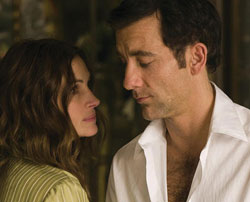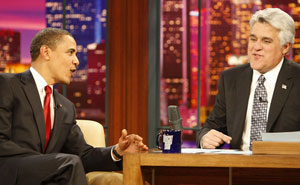 Julia Roberts! Clive Owen!
Julia Roberts! Clive Owen!
And a movie that’s compelling.
Such is what we’re offered in “Duplicity,” the new romantic comedy from Universal Pictures. (You can check out both the film’s trailer and a great review on USA Today’s website).
I loved the film, and was inspired by it for three main reasons:
First, Tony Gilroy, the director of “Michael Clayton,” has brought us a true but fair plot that is as complex as it is realistic. All too often, our current dramatic plots are either too predictable or too unbelievable. “Duplicity” lands in the realistic middle, marking a wonderful change of pace that drew me in without telling me where to go.
Second, Clive Owen and Julia Roberts bring the kind of chemistry that most movie-goers long for, yet rarely find. Whether it’s boy vs. girl, spy vs. ex-spy, or in-crowd vs. out-crowd vs. in-crowd, the on-screen relationship between Mr. Owen and Ms. Roberts is as intriguing as it is inviting, as confusing as it is unifying.

Third, “Duplicity” brings to bear a question that haunts us all: what if–in the final analysis–our choices come down to who we care for vs. what we believe in? What will do we do? What should we do?
The movie invites us to ask them on the way home with the one we love, or tomorrow when we call the one we love to ask about what’s most important. The answers may not be simple, but they’re relevant. And, they’re important.
All too often, the hard questions of life are either too difficult or too unattractive to pursue or answer. I almost hate to say it, but putting Mr. Owen and Ms. Roberts on the screen brings enough attractiveness and panache to draw us in to some deeper questions which the film itself doesn’t pose…but we all should.
It’s a fine ride and well worth it. And, it’s well worth the follow-up questions it compels us to ask.


